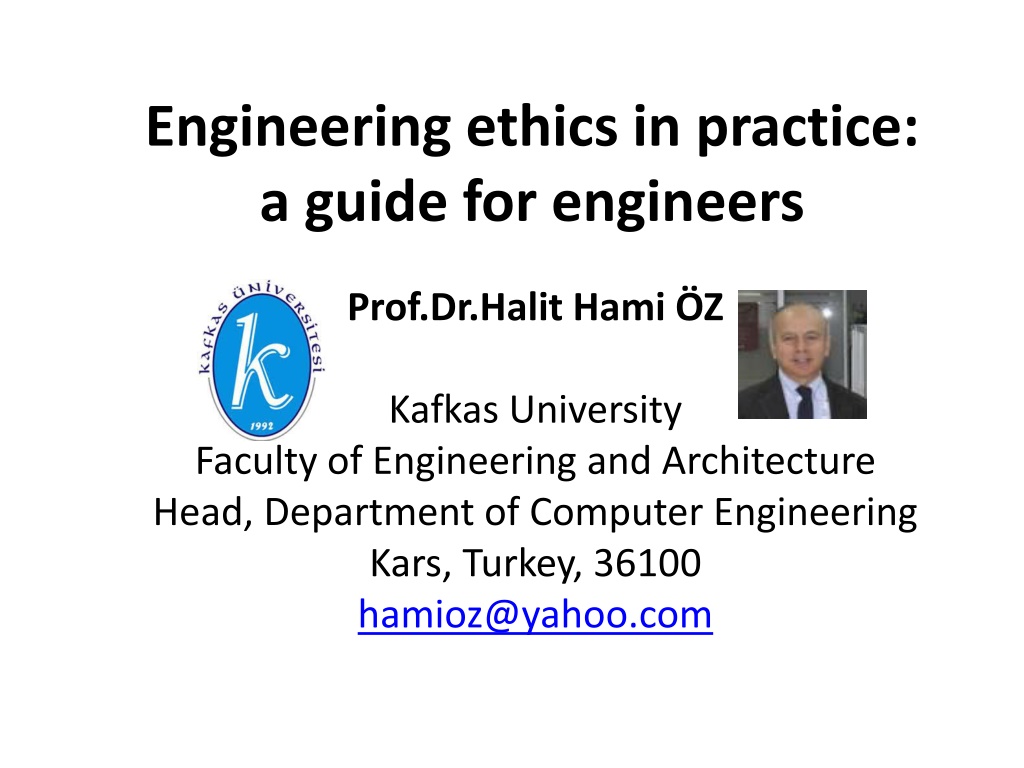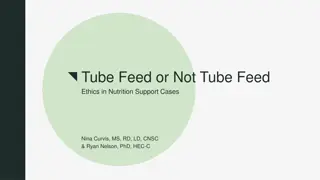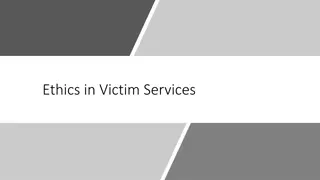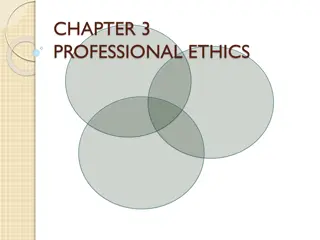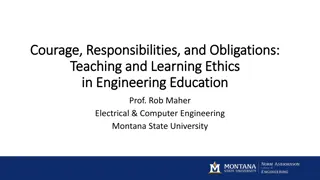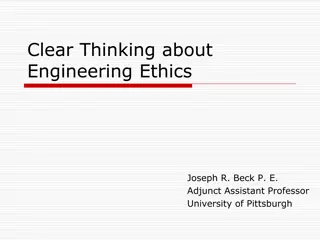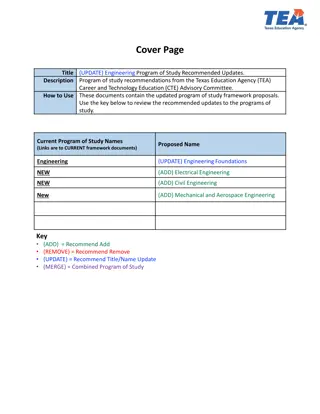Understanding Ethics in Engineering Practice
Exploring the principles of honesty and integrity in engineering ethics, the text discusses dilemmas faced by professionals, such as dealing with unethical competitors. It emphasizes the importance of maintaining honesty and integrity in interactions while navigating complex ethical scenarios in the engineering field.
Download Presentation

Please find below an Image/Link to download the presentation.
The content on the website is provided AS IS for your information and personal use only. It may not be sold, licensed, or shared on other websites without obtaining consent from the author. Download presentation by click this link. If you encounter any issues during the download, it is possible that the publisher has removed the file from their server.
E N D
Presentation Transcript
Engineering ethics in practice: a guide for engineers Prof.Dr.Halit Hami Z Kafkas University Faculty of Engineering and Architecture Head, Department of Computer Engineering Kars, Turkey, 36100 hamioz@yahoo.com
I used the Engineering ethics in practice: a guide for engineers book written by The Royal Academy of Engineering for teaching as well as making the ppt presentations about the Engineering Ethics course Prof.Dr.Halit Hami Z Prof.Dr.Halit Hami OZ - Engineering Ethics Course 2
3 Chapter introduction: Honesty and integrity Honesty and integrity is the second principle listed in the Engineering Profession s Statement of Ethical Principles. This states that Professional Engineers should adopt the highest standards of professional conduct, openness, fairness and honesty . Prof.Dr.Halit Hami OZ - Engineering Ethics Course 3
3 Chapter introduction: Honesty and integrity If I know that a competitor is bidding unethically, but will win the business, should I a) match his unethical behaviour in order to win the business which was rightly ours, or b) expose the unethical nature of the rival bid, therefore jeopardising the confidentiality of the unattributable source, or c) walk away from the business and retain the moral high ground? Competitors are often less ethical... How does one compete with people that lie? (Engineering ethics in practice survey) Prof.Dr.Halit Hami OZ - Engineering Ethics Course 4
3 Chapter introduction: Honesty and integrity Honesty and integrity are in fact two separate but closely related concepts. While they have different meanings, it is hard to imagine anyone exhibiting one without the other. At least, someone who is dishonest is unlikely to be described as having integrity. Prof.Dr.Halit Hami OZ - Engineering Ethics Course 5
3 Chapter introduction: Honesty and integrity Engineers are likely to work for the benefit of a number of different groups of people, and in many cases will have a duty to keep these people informed of relevant facts. The public trusts professionals to provide information that is as complete and accurate as possible. Honesty is not simply a matter of not lying: an engineer may at times need to disclose information which has not been requested directly, and which in some cases people may not want to hear. In other cases, such as where there is a duty to maintain confidentiality, for example to a client, it may be unethical to disclose information which would jeopardise that confidentiality. In these cases, failure to disclose would not necessarily be dishonest. Prof.Dr.Halit Hami OZ - Engineering Ethics Course 6
3 Chapter introduction: Honesty and integrity Integrity is a more difficult concept to define. It has to do with acting ethically, even when there is no personal advantage to doing so. A person of integrity will resist pressure to compromise their ethical values and principles, whether that pressure comes from employers, clients, or anywhere else. They will take steps to avoid conflicts of interest or, where this is not possible, declare these conflicts clearly and do their utmost to avoid improper influence. People with integrity are consistent and reliable, and their actions match up to their words. Prof.Dr.Halit Hami OZ - Engineering Ethics Course 7
3 Chapter introduction: Honesty and integrity For some, integrity may also mean standing for something , trying to change practices and attitudes that seem less than ethical; it might mean trying to influence for the better the practices of an employer, the engineering profession, or even society at large. According to the Statement of Ethical Principles, an engineer should take steps to prevent corrupt practices or professional misconduct in others, and not simply avoid falling into such practices individually. Prof.Dr.Halit Hami OZ - Engineering Ethics Course 8
The boxes below give some brief engineering examples relating to honesty and integrity: Dave is employed by a radio broadcast equipment manufacturer as a sales representative. In addition, Dave works as an independent consultant for organisations in the radio broadcast field. This work can include analysing their technical problems and, when required, recommending any radio broadcast equipment that they might need. In some cases, Dave recommends the use of broadcast equipment manufactured by his employer. Is it enough for Dave to declare his conflict of interest, or should he resign one of his positions? Prof.Dr.Halit Hami OZ - Engineering Ethics Course 9
The boxes below give some brief engineering examples relating to honesty and integrity: Esther works on military contracts for a company manufacturing sensors which can detect and warn of the presence of chemical and biological agents. Esther is proud that her work contributes to equipment that saves lives. One day, she is asked to begin working on a new lightweight radar which can sense and display the movement and location of soldiers and vehicles on the battlefield. With this information soldiers can quickly call in mortars and artillery fire to destroy enemy positions. Can Esther work on the new project and keep her integrity? Prof.Dr.Halit Hami OZ - Engineering Ethics Course 10
The boxes below give some brief engineering examples relating to honesty and integrity: Faisal is a technician working on the central heating system for a building which is occupied by a large financial services company. One day, while carrying out maintenance work in one of the building s corridors, he overhears two executives talking about a debt crisis at the company, something which has not yet been communicated to the public. Later, Faisal s friend, who owns shares in the company, asks him if he knows anything about the company s financial health. Should Faisal warn his friend about what he has heard? Prof.Dr.Halit Hami OZ - Engineering Ethics Course 11
3 Chapter introduction: Honesty and integrity In the following chapters, more detailed cases, based on real scenarios, are used to illustrate different aspects of honesty and integrity. These cases are designed to be challenging, and to allow reflection on what the principle means in practice. Prof.Dr.Halit Hami OZ - Engineering Ethics Course 12
3.1 Affecting others Professional engineers should be alert to the ways in which their work might affect others and duly respect the rights and reputations of other parties Scenario ALN Monitoring have contacted a consultant electronics engineer to develop an internal surveillance system for residential buildings. The system is required to sense human activity in a very refined way, in terms of normal and abnormal bodily movements, and the engineer has been hired to develop the hardware for the system, including the user interface. It is an interesting project as there are considerable technical difficulties involved in co-ordinating the various different kinds of cameras and sensors that will be required, and in processing the large amount of information. Prof.Dr.Halit Hami OZ - Engineering Ethics Course 13
3.1 Affecting others As the engineer begins to work on the project, she holds a meeting with ALN monitoring to discuss the layout of the residential buildings in which the system will be placed. The engineer discovers that the system will in fact be used as a monitoring system for elderly people in their own homes. The team from ALN Monitoring inform the engineer that the system is wanted by relatives of infirm elderly people, who wish to have peace of mind about the welfare of their elderly relatives. The aim of the monitoring system will be to pick up abnormal movements - such as falls and trips, and the staff that will be monitoring the system will be able to summon help quickly. Prof.Dr.Halit Hami OZ - Engineering Ethics Course 14
3.1 Affecting others On further investigation, the engineer learns that some people have concerns about the system. ALN Monitoring have been contacted by a local charity representing elderly people who are worried about the issue of consent. Many of the elderly people for whom the system is designed will be mentally as well as physically frail, and therefore may not be able to fully comprehend the nature of the system. This raises the worry that the implementation of the system will constitute an invasion of their privacy. Prof.Dr.Halit Hami OZ - Engineering Ethics Course 15
3.1 Affecting others Learning about the planned application of the monitoring system has given the engineer something to think about. If the system is going to involve cameras and sensors monitoring the activities of individuals who have not fully consented, due to not being sufficiently mentally competent to understand, then she has reservations about continuing to work on the project. The impact of her work on the end user is something she wishes to take seriously. Prof.Dr.Halit Hami OZ - Engineering Ethics Course 16
Dilemma You have started consultancy work on a project to develop a sophisticated monitoring system for residential buildings, and you learn that the proposed use is as a surveillance system for elderly and infirm individuals. There is a concern that as some of those individuals will not have the mental capacity to understand the system, and so will not be able to fully consent to the system, your work might lead to an invasion of individuals privacy. Prof.Dr.Halit Hami OZ - Engineering Ethics Course 17
What should you do? You could refuse to continue working on the project, on the grounds that you are unhappy with the proposed use of the technology. You could continue work on the project, as you feel that there are relatively simple measures that could ensure that there is no invasion of privacy. You could continue work on the project on the condition that the system allows the person being monitored to turn it off, which is not part of the current specification. Prof.Dr.Halit Hami OZ - Engineering Ethics Course 18
Discussion This situation places you in the position of a designer having to think about the future use of the technology they are developing. In this situation, the system you are designing may end up infringing the right of elderly people to privacy in their own homes. By monitoring their actions with cameras and sensors, the surveillance system that ALN Monitoring wish to produce could be considered intrusive in a way that should not be inflicted on people without their consent. The mental frailty of some of those for whom the system is designed opens up the possibility of someone being monitored without their full co-operation, as they may not be competent to understand the process. Prof.Dr.Halit Hami OZ - Engineering Ethics Course 19
Discussion As a designer, you are being asked to consider how your obligations extend to the end-user. You may think that your job is merely to provide the client with a product that fits their specification, and that may be true in the standard situation. Most people would feel, however, that it would not be acceptable to design a lethal device knowing it would be intentionally used on innocent people, or to design an addictive and potentially dangerous drug that would be supplied to children. So the welfare of the end user is certainly relevant, if the end user is under sufficient threat. If you feel that the threat to the users of the monitoring system is high enough, you may choose the first option and refuse to work on the project. Prof.Dr.Halit Hami OZ - Engineering Ethics Course 20
Discussion You may feel that any threat to privacy that does exist can be mitigated in some way, and the third option offers one route to this by providing a method of switching off the mechanism. Even this may not be suitable for those users lacking comprehension of the system, and you may wish to find other ways of limiting the possibility of harming the welfare of the vulnerable people for whom the product is designed. Prof.Dr.Halit Hami OZ - Engineering Ethics Course 21
Summary This situation reflects on the importance of considering the use of products you have helped to engineer. There is clearly a potential benefit to the systems, but the effect of the product on privacy and the problem of consent should not be ignored. Whichever route you choose it is important to be confident in the decision you choose, and to be able to defend that decision to others Prof.Dr.Halit Hami OZ - Engineering Ethics Course 22
Other ethical considerations involved in this case This case also touches on questions of respect for life, law and the publicgoodsince it introduces consideration of the public interest into anengineering context. Following from this, important questions of responsibleleadershipare also raised society entrusts engineers with the managementand exploitation of technologies, and as such it is important to take full account of the wider good of society and issues of public concern when making engineering decisions. Prof.Dr.Halit Hami OZ - Engineering Ethics Course 23
3.2 Preventing corruption Professional engineers should avoid deceptive acts, take steps to prevent corrupt practices or professional misconduct, and declare conflicts of interest Scenario Sudobuild is an international civil engineering consultancy that undertakes work all over the world. They have been assigned to direct a project in a developing country involving the development of a large hydroelectric installation that will in due course provide power for a town of several hundred thousand inhabitants. In conjunction with a business manager, the project manager negotiates the terms of the deal with the client, who is the construction company that will be building the facility Prof.Dr.Halit Hami OZ - Engineering Ethics Course 24
3.2 Preventing corruption The client agrees the contract with Sudobuild, and they inform the project manager that the funding for the consultancy work will be coming from a donor-backed central government fund dedicated to the development of energy production facilities. A small team from Sudobuild, including the project manager, flies out to provide guidance on the plans that have been developed, to give specific direction on ensuring that the facility can cope with a wide range of flow variation. Prof.Dr.Halit Hami OZ - Engineering Ethics Course 25
3.2 Preventing corruption After the work is complete and the project manager is submitting an invoice, the client asks the project manager to invoice for twice the original amount. The client explains how this specific government fund operates; the fund is supposed to pay for 50% of the fee, and the client company is supposed to pay the other 50%. However, key individuals involved in the administration of the fund have developed a practice whereby consultants bill for double the amount, thus ensuring that the government covers the whole cost of the work. Prof.Dr.Halit Hami OZ - Engineering Ethics Course 26
3.2 Preventing corruption The fee for Sudobuild s services in this situation is 370,000, of which only 185,000 was supposed to come from the government fund. The client is proposing that Sudobuild invoices for 740,000, and Sudobuild will then receive the full 370,000 that the government pays. The client points out the benefit of this from Sudobuild s perspective: they are paid in full, and on time. This is rare in consultancy work of this kind, and will save both time and money for the accounts department. The benefit for the client company is clear, as they receive the services without having to pay for anything. The government is none the wiser, as the administrators of the fund conceal the procedure from senior government officials. Prof.Dr.Halit Hami OZ - Engineering Ethics Course 27
3.2 Preventing corruption On being informed of this unilateral change of procedure by the client, the project manager expresses surprise, and some anger. The project manager does not wish to participate in the theft of state funds however normal it is, and the manager explains Sudobuild s position to the client company. The client company then breaks some disappointing news; they say that they do not have the money to pay the consultancy fee. They claim to have available only a quarter of the 50% that they were scheduled to pay Sudobuild, and they urge the company once more to follow the process they have outlined so that Sudobuild can receive their full payment. Prof.Dr.Halit Hami OZ - Engineering Ethics Course 28
Dilemma You have undertaken some consultancy work with a foreign company, under a scheme whereby half of your fee comes from the central government. However, the client company informs you after the work has been done that they are in financial difficulties, and that the only way you will be paid in full is if you falsify the invoice document so that the government pays 100% of your fee. You are also told that this is standard practice, and happens with the cooperation of the administrators of the government fund. Prof.Dr.Halit Hami OZ - Engineering Ethics Course 29
What should you do? You could agree to the process as described by the client company. It is important that Sudobuild get fair remittance for the work they have undertaken, and administrators of the government fund have approved the practice of doubling the invoice. You could refuse to participate in the practice, and accept whatever funds that the client company have available. You do not want to engage in corruption, but you do not want to sever your relationship with this company and others in the region. You could refuse to double your invoice, and take the client company to court to recover your fee. It is important to take a stand against corruption, and to ensure that companies face up to their financial obligations. Prof.Dr.Halit Hami OZ - Engineering Ethics Course 30
Discussion This situation places you in a scenario where perhaps the simplest course of action, refusing to get involved in the situation at all, is not possible. You are already embroiled in the situation, and you have been placed in an uncomfortable position. Your job in this case would be to manage the problems as best as possible for everyone concerned. Prof.Dr.Halit Hami OZ - Engineering Ethics Course 31
Discussion Perhaps the main point to consider is that doubling your invoice is likely to constitute fraud. It is clearly against the explicit rules of the fund, and also against the spirit in which the fund was established. Doubling your invoice is equally clearly an act of falsification of an official document. The consequences of this type of fraud are very serious. Both the company and responsible managers could be liable both for a criminal conviction, and for damages. In addition, you may be committing consequent accounting, tax and money laundering offences. The fact that it is standard practice, and that it has been endorsed by the administrators of the fund, does not provide a defence. Prof.Dr.Halit Hami OZ - Engineering Ethics Course 32
Discussion Sensitivity to differing working practices and business procedures is a key part of undertaking work in foreign countries. This sensitivity entails not rushing to ethical judgements about the way things are done, but it equally does not mean giving blanket acceptance either. Just because something is normal, does not make it acceptable from your point of view as an employee of a company with its own values and standards. Nor does it make it legal; you must never issue a false invoice. Prof.Dr.Halit Hami OZ - Engineering Ethics Course 33
Discussion You must avoid endorsing and participating in that process. If short-term benefits are the main issue, then taking the company to court may be the most attractive option. This may constitute the best way of getting your money, but may have a negative impact on your reputation in the area. Not only have you refused to play by the normal rules, you have also launched legal proceedings against a local company. Accepting a smaller amount of money in return for maintaining positive relationships with the local companies could be the better long-term option, but not if they are likely to repeat this conduct. Prof.Dr.Halit Hami OZ - Engineering Ethics Course 34
Summary Several issues need to be balanced in this situation: the reputation of your company, the need to be paid for your work and how to deal with corrupt practices. Going along with the practice may appear to be the easiest option, but it is illegal and would constitute a deceptive act and a corrupt practice , both of which are explicitly prohibited by the code of conduct. Agreeing to take a smaller amount of money, on the other hand, may result in your company being seen as lacking business acumen, and you may risk other clients trying to do the same with you, resulting in your company not being paid for their work. Equally, while court proceedings may expose the corrupt practice of your client and offer a way of recovering your money, you run the risk of alienating many potential clients in the area. Prof.Dr.Halit Hami OZ - Engineering Ethics Course 35
Other ethical considerations involved in this case This case raises questions of accuracy and rigoursince it touches on an engineer s duty not to mislead about engineering matters. It is also particularly relevant to issues of respect for life, law and the public good: work must be undertaken lawfully, and the reputation of the profession must be upheld. This reputational element is important since, even in cases where you think the suggestion of your client does not constitute corruption, you must also consider whether it will look as though you have acted corruptly. Finally, you also have a duty to be truthful and not to take advantage of the trust placed in you by society. These considerations are part of your obligation to show responsible leadership. Prof.Dr.Halit Hami OZ - Engineering Ethics Course 36
Wider applications Imagine you find out that senior local government managers in your civil engineering section are giving preferential treatment to their friends, equivalent to significant overpayments in consultancy payments. Prof.Dr.Halit Hami OZ - Engineering Ethics Course 37
Wider applications One issue that can arise regarding corrupt practices is what to do when you discover that they are happening. If this involves senior members of your organisation then the problem becomes acute, as there are fewer options to report the activities within the normal channels. You will have to consider disclosing information either to regulators or to other relevant parties. The effect on your own career and reputation, at least in the short term, may be severe and you will have to consider the effects on your family and personal situation before deciding how to balance your professional responsibilities. Prof.Dr.Halit Hami OZ - Engineering Ethics Course 38
Wider applications Imagine you are an experienced engineer moving into a new industry sector in which corruption in procurement and contracting procedures is rife. You want to put measures in place to prevent the prevalence of corrupt practices. Prof.Dr.Halit Hami OZ - Engineering Ethics Course 39
Wider applications You may have advance knowledge that a role may involve dealing with corrupt practices. There are certain engineering sectors, and certain areas in the world, where corruption is a significant issue. In this kind of situation, you will be faced with putting systems in place, at an individual and organisational level, to deal with those pressures. These measures may include rigorous oversight of financial decisions and increased disclosure both inside and outside the organisation. A crucial step may also be to inform new and experienced staff about the legal, ethical and social situation regarding corruption and bribery. Prof.Dr.Halit Hami OZ - Engineering Ethics Course 40
Wider applications You come to realise that a public procurement official, who happens to be a good friend of yours, has overpaid you for some stock. You did not realise this at the time, and you are uncomfortable that you received preferential treatment Prof.Dr.Halit Hami OZ - Engineering Ethics Course 41
Wider applications If you find yourself in the position of having received unwarranted benefits, on the basis of friendship, family ties or other factors, you will be faced with a difficult decision about disclosure. It may be tempting to remain silent on the grounds that there was no corrupt intention on your part, but you will have to be aware of how things may appear. It may be necessary to be open about the situation, although the effect of this on the friend (family member, etc.) that was involved will have to be considered. In particular, once you have discovered that there has been an overpayment, you should immediately repay the overpayment, otherwise you could be committing a criminal offence. Prof.Dr.Halit Hami OZ - Engineering Ethics Course 42
